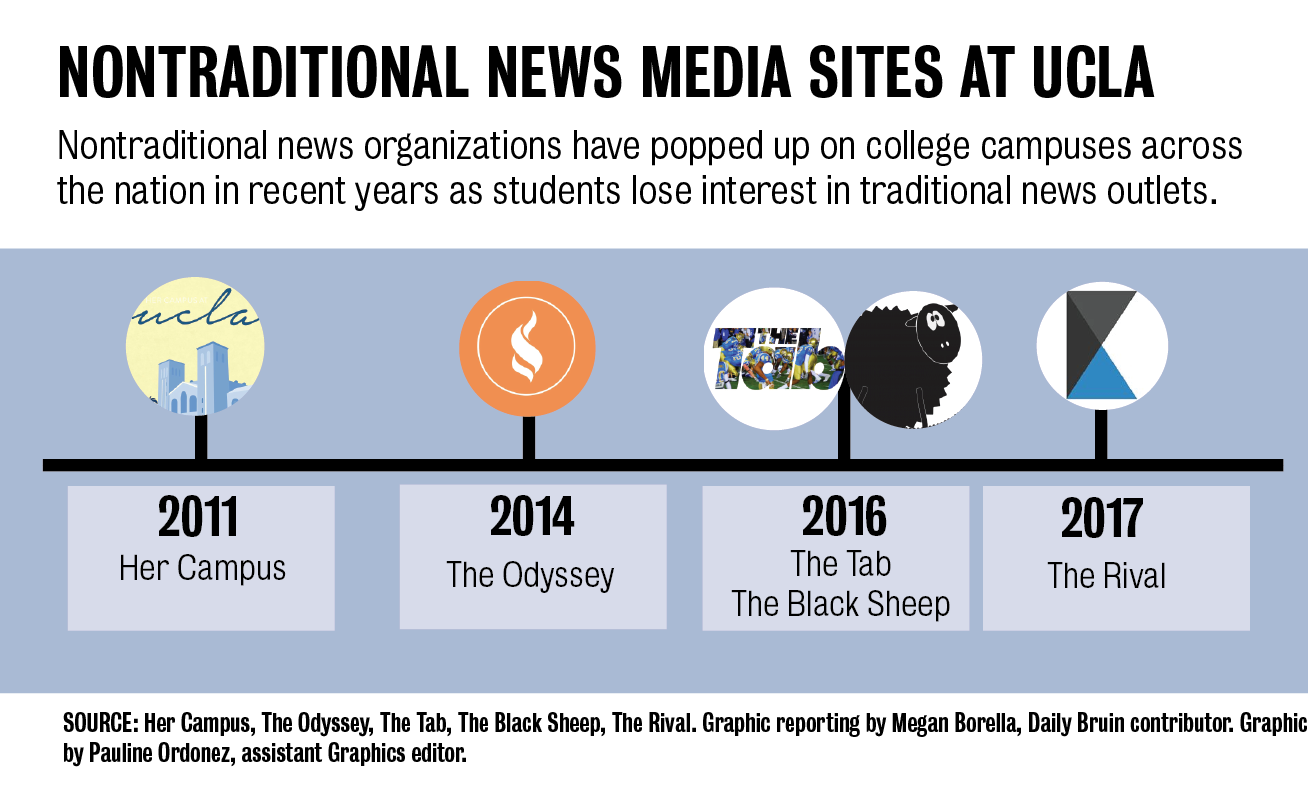Students explore nontraditional media options to get news

By Megan Borella
June 26, 2017 12:29 a.m.
Some students who find college newspapers boring are paving the way for different forms of student media.
These new media differ from established types of student media in content, production or distribution. They also tend to advocate for minority groups and others not often represented in mainstream culture.
One example is The Rival, which is an opinion, commentary and satire publication concerning college life and news across America. Josh Strupp created the publication with his friends Myles Field and Hannah Mouyal when he studied at George Washington University in 2014. Strupp has expanded The Rival to over 17 campuses nationwide, including UCLA.
While studying journalism, Strupp said he realized students felt apathetic toward news publications on campus. He added he found it important for students to be able to make editorial decisions themselves.
Strupp said The Rival is meant to be a place for different voices, not a replacement for regular news publications. He added he hopes it can exist alongside traditional media.
“Consider it a combination of VICE and The Onion,” he said.
Strupp and his colleagues named their publication The Rival because they wanted to establish themselves as an unusual brand, he said.
“Our structure and style is hard to find elsewhere and we were proud of that, so we needed a name to fit that attitude,” Strupp said.
Another media group is Odyssey, which operates throughout several college campuses. Odyssey is meant to discuss topics of interest to students in an amusing, relatable way. Its articles include headlines such as “Your Water Bottle Spills Your Secrets” and “The Science Of Being A Student.”
Sarah Erckenbrack, an Odyssey writer for UCLA, said more expressive reporting is growing in popularity as many stories become more opinion-based and individuals get their news through various sources rather than a single media outlet.
Sarah Roberts, a media studies expert and assistant professor of information studies in the UCLA Graduate School of Education and Information Studies, said she thinks these emerging media are more of a pushback against mainstream media.
“An interesting phenomenon of social media is that everything on these platforms has been reduced to an equal level, so unestablished outlets with low credibility can exist and circulate side by side with venerable news outlets,” Roberts said.
Roberts added she does not think nontraditional media will take over from more common news outlets entirely. She added she thinks fake news has raised the profile of more traditional media outlets.
Gianinna Campo, a first-year biology student, said she thinks adding a bit of sarcasm to news is fun, and that traditional newspapers are boring.
“I don’t always agree when sarcasm becomes out of hand, but it may be growing more commonplace as generations change because people like to be entertained,” Campo said. “This could eventually overtake traditional news.”
Milagros Gonzalez, a first-year mathematics student, said she thinks it is better to be able to laugh about news and understand current events through a more entertaining platform.
“Looking at on-campus news differently from what you’re used to is good because traditional news can be boring,” Gonzalez said. “Such media can become a normal way of reporting to make news more accessible to a wider audience, but many people will still want to hold on to a more traditional journalism style.”
Bianca Martin, a first-year undeclared student, said she thinks making news amusing is an effective way to engage people who don’t normally keep up with the news.
“It is a way to be informed yet still entertained,” she said. “If news is too serious and uninteresting, it gets boring.”
Other students, like Ryan Teng, a second-year economics student, said they prefer traditional news to nontraditional media.
“Traditional news is more straightforward with less focus on entertainment and more emphasis on facts,” Teng said.
By relying on humor and satire to tell a narrative, nontraditional media can sometimes run the risk of twisting a story, said Grace Bower, a first-year microbiology, immunology and molecular genetics student.
“Someone is … trying to make a story more humorous and they also have more of an agenda,” Bower said.
Bower said she does not think traditional media will ever go away because they are ingrained in society, but added she thinks they will probably change.
“Traditional media and (nontraditional) media have a symbiotic relationship because alternative media comments on traditional media sources,” Bower said.

